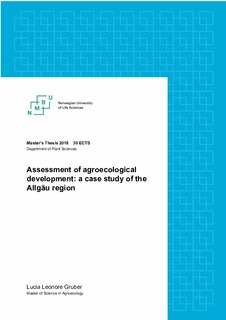| dc.description.abstract | The framework of agroecology territories suggests that transitioning to sustainable agriculture and food systems is most efficient on a territorial scale. To understand the processes and show positive outcomes of agroecological development a measurement instrument is necessary. Therefore, this study combines the creation of an indicator-based assessment tool and its exemplary application in the Allgäu, a region in the south-west of Germany. Using the concept of agroecology territories as directive, combined with the opinion of local experts, 15 indicators were created and grouped in the following three dimensions: (1) adaptation of agricultural practices, (2) conservation of biodiversity and natural resources, and (3) development of embedded food systems. Data about the Allgäu region was mainly obtained by semi-structured interviews with stakeholders from the different dimensions, structured interviews with farmers, on-site observations and complementary literature and online research. In addition to the indicator-based analysis, a stakeholder analysis was conducted, as stakeholder initiative is an essential attribute of an agroecology territory. The results from the assessment tool shows that the indicators were a suitable approach. Moreover, the findings in the Allgäu also show that the region can be called an agroecology territory. Initiatives that connect all three dimensions, such as the Allgäuer Alpgenuss label, raise attention for authentic high-quality culinary services in the Alpine gastronomy. Hereby, traditional agriculture and processing techniques are maintained, which lead to conservation of the landscape, add touristic value, and a premium price for the local products. The strong regional identity of stakeholders and citizens is advantageous, too. The stakeholders in the region are uniquely connected through the overarching Allgäu brand, which transmits commonly pursued values of regionality, sustainability and quality. The wide scope for interpreting agroecology made the selection of indicators challenging, as well as coping with the unavoidable subjectivity introduced by the researcher and the involvement of stakeholders, but the later were crucial to the process. The assessment tool from this study can be applied in other regions to evaluate agroecological transition. Further, the findings about the Allgäu can serve as baseline to put findings from other regions into relation, through the comparison insight in most efficient processes and initiatives can be gained. | nb_NO |

